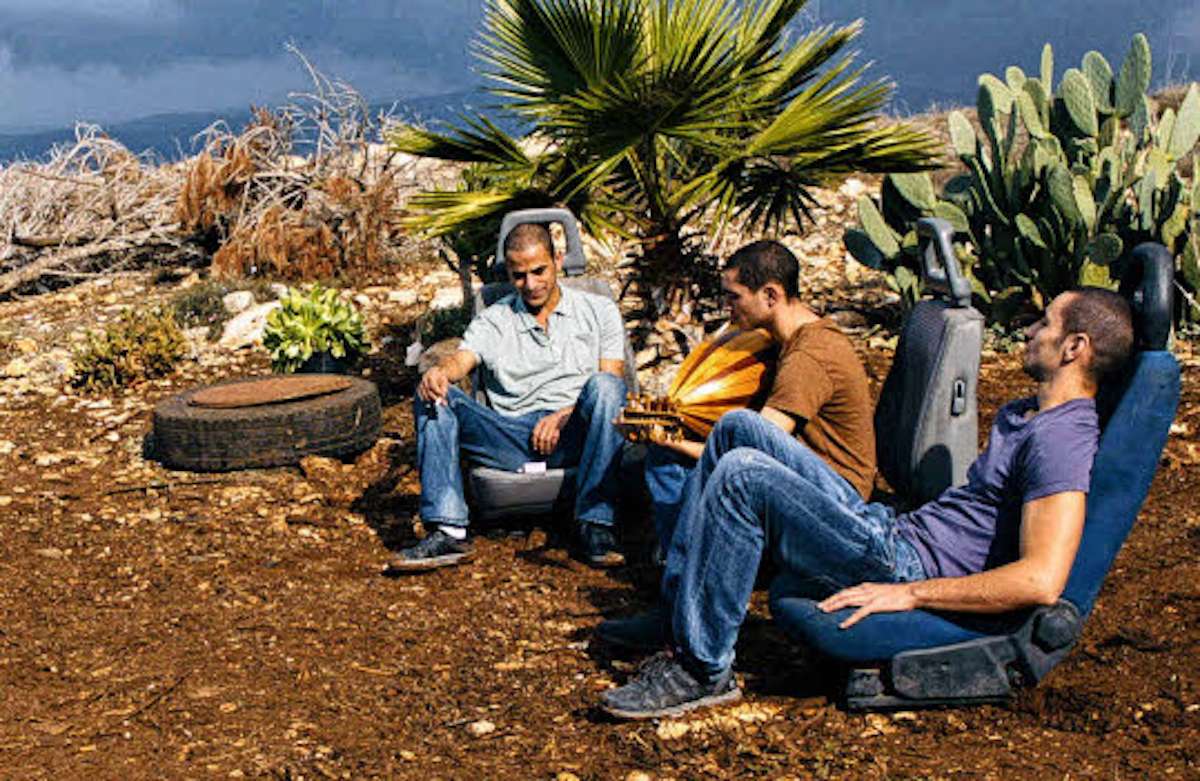Oppressed populations are the battered housewives of civilization. If you crush them enough, one-time activists cease all forms of resistance; they turn against themselves and each other. Such is the case in “Omar,” Hany Abu-Assad‘s new Oscar-nominated feature about a young Palestinian baker hoping to get married while working as a resistance fighter. Abu-Assad’s previous Oscar winner, “Paradise Now” (2005), followed two suicide bombers in a climate of boiling pressure. This film, produced nearly a decade later, chronicles friends and rebels in a disintegrating world.
Omar (Adam Bakri) opens the film climbing up the infamous Wall, built to keep Israelis safe from Palestinians. For the Palestinians, however, these walls lock them in the world’s largest prison. This stretch of the divider in Qalandia (like many) does not separate Palestine from Israel, as much as it splits the Palestinian neighborhood in half. Rather, one side is a neighborhood, and the other side is a refugee camp.
As he reaches the top of the barrier, guns presumably from Israel Defense Forces (IDF) fire upon him, missing him by inches. He makes it over and runs through a block of thin, claustrophobia-inducing corridors until he arrives at the home of his secret fiancée, Nadia (Leem Lubany) and her protective brother, Tarek (Iyad Hoorani).
Omar’s love for Nadia has all the elements of an American high school romance, except that they are Palestinian and twentysomethings. He scales walls instead of trellises to visit her. He meets her by the window, not of her bedroom, but of her work. They exchange short love notes, thrilled to give them, thrilled to receive them.
Tarek takes Omar and a friend, Amjad (Samer Bisharat) to practice firing rifles. Soon, they are ready for their mission to shoot an IDF soldier. No purpose is given for the attack, except that their Brigade identifies itself as Freedom Fighters. Meaning, it goes without saying that this is a fight between the occupied and the occupiers. “Paradise Now” featured debate about the ethics and utility of armed resistance. Here, there is no apparent strategy, no discussion, and definitely no religion. What remains are strikes that seem arbitrary, lacking a wider plan. Meaning, the resistance fighters have given up on everything else.
Those two threads carry the film. This is a group that has almost nothing of ambition to live for. Omar aims only to spend his life with Nadia. Tarek finds purpose only to fight in an endless struggle. Amjad, often the butt of jokes, piggybacks off the other two. There is nothing else left. In “Paradise Now,” some of the characters had hopes and dreams of a foreign world away from the struggle, if not a better world at home. Here, Nadia makes a single reference to life away from Palestine. Otherwise, we are watching people living not only in an unhealthy environment, but locked in cycles of behavior, the way a bread machine churns dough over and over. And over.
The film builds, rather, descends and slides toward a series of unfortunate confrontations. The architect for some of these a mysterious Agent Rami (Waleed Zuaiter), who speaks in clear Arabic yet his ethnicity is uncertain. Just as the opening shot with the Qalandia Wall is unfiltered social commentary, so too is the final shot a critique about the consequences of this national dispossession: everyone hides behind walls physical and emotional, yet nobody is any longer safe.
Hany Abu-Assad takes far more ambitious dramatic, visual and political efforts here than he has in the past. He mixes disarming humor with his disquieting plot turns. His chase scenes speed through the ancient structures in the tradition of Frankenheimer. His fluid camera recalls the French filmmakers of the 1960s. His IDF soldiers invoke Spike Lee’s police officers from “Do the Right Thing” (1989) and “Jungle Fever” (1991), ever present and ready to humiliate, except that they are here fired upon.
Abu-Assad is one of the few major voices in cinema presenting a Palestinian narrative, full of criticism and self-criticism. In our society, especially, it is very difficult to comment on Israeli policies without being stamped with charges of anti-semitism and double-speak. It is not any more anti-semitic to criticize Israeli policies than it is Islamophobic to criticize Saudi Arabian policies, though many critics of Israel are indeed anti-semites, and many critics of Saudi Arabia are indeed Islamophobes. Likewise, there is a major political sector in our society, in bed with the Christian Zionist movement, regarding itself as the true American patriots, that has multiple instances of siding with the Israeli head of state against our own, which is ludicrous. The point in all this is that the Palestinian voice and narrative get repeatedly quashed. Some even dare claim that the Palestinian peoples themselves are an invented population.
That is not to say that this film is very pro-Palestinian, calling for action. There is, among the various Israeli narratives, the agenda to present the nation as constantly under threat, if not by Palestinians, then by the rest of the Arab states or by Iran. So long as that narrative remains prominent, then it becomes easy to seize Palestinian land for the construction of new settlements, and it remains easy to bankroll the war machine. Thus, this film is easy to use to support that narrative. But, Abu-Assad’s goal here is not so much to promote any notions of Palestinian statehood, or even solidarity. Rather, he is chronicling another phase in the dispossession, erasure, and consequent self-destruction of a people. In that sense, this film reminded me of “Boyz’n the Hood” (1991), except that the final frame of that film was still marginally hopeful. As this film reaches its end, we somehow feel like we are reaching the end of something larger, as though the only way to finally make it over those walls is with the support of the elders of the past, who are long gone.
If we follow these two films—”Paradise Now” and “Omar”—as the groundwork toward a trilogy, I wonder if a third film, produced a decade from now, would have any Palestinians left.












